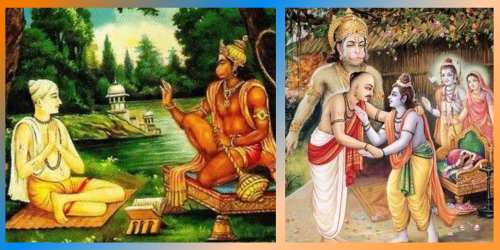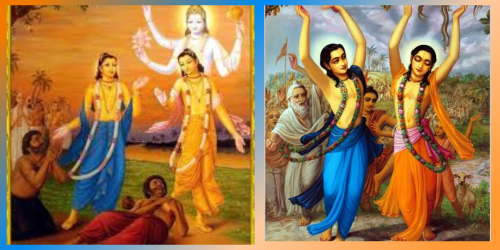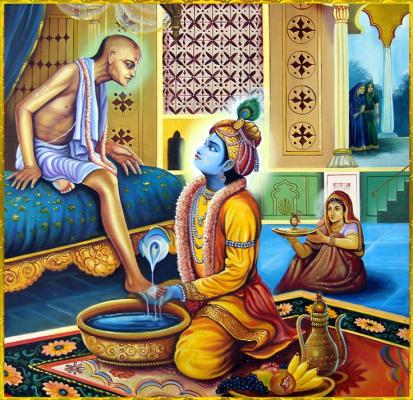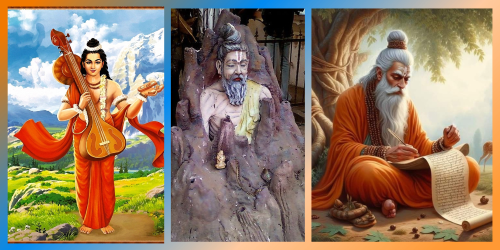
From the Editor’s Desk
Divine grace is a concept that resonates deeply within spiritual traditions, especially Sanatan Dharma. Divine grace is the benevolent, unmerited blessing from the Supreme Lord that guides and uplifts seekers on the spiritual journey.
In this month’s issue of Samarpan, we explore the profound nature of divine grace, drawing insights and inspiration from Vedic knowledge (i.e., tattvagyan) taught by Swami Mukundananda. We also provide numerous real-life examples of how divine grace transformed individuals from within. Finally, we share some practical tools for application to help deepen our understanding of divine grace.

Vedic Wisdom & Application
Challenge of the Month
Understanding Divine Grace
Reflection Questions
- What does Divine Grace mean?
- What is the Role of Divine Grace in the Spiritual Journey?
- What is the Difference Between Coincidence and Divine Grace?
- How Can We Attract Divine Grace?
An interesting incident took place in the life of Saint Tulsidas, the revered poet-saint and author of Ramcharitmanas. Tulsidas ji’s longing to have the darshan of Lord Ram was very intense. He kept intensifying his sadhana or devotional practice while beseeching God to reveal Himself. Then one day, Lord Hanuman blessed him with the vision of Lord Ram. Tulsidas ji’s inspiration knew no bounds! Subsequently, he composed the immortal verses of Ramcharitmanas, which continue to inspire millions to date.

When divine grace enters a devotee’s life, it brings a sense of fulfillment and contentment that is independent of external situations. This joy is not a fleeting emotion but a stable, inner state of being that arises from the soul’s connection with the Divine.
What is Divine Grace?
Divine grace refers to the divine energy or blessing that flows into a person's life. It is the manifestation of God's love, knowledge, and bliss. When one receives divine grace, they experience a deep connection with God and are filled with divine qualities. This grace helps individuals transcend worldly desires and find inner peace and fulfillment. It is through divine grace that one realizes the importance of spiritual growth and the ultimate goal of attaining union with God. As Shree Krishna explained to Arjun:
प्रसादे सर्वदु:खानां हानिरस्योपजायते |
प्रसन्नचेतसो ह्याशु बुद्धि: पर्यवतिष्ठते || 65||
prasade sarva-duhkhanam hanir asyopajayate
prasanna-chetaso hyashu buddhih paryavatishthate
By divine grace comes the peace in which all sorrows end, and the intellect of such a person of tranquil mind soon becomes firmly established in God (BG 2.65).
Divine Grace is also described as the causeless compassion of God that is bestowed upon us without any conditions or expectations. Swamiji’s teachings emphasize that grace is not something we earn but rather a gift from the Divine, granted out of pure compassion and unconditional love. It is only through grace that we can overcome the obstacles in our spiritual path and progress toward the ultimate goal of God-realization.
A very well-known example can be drawn from the life of Jagai and Madhai, the two brothers who led a life of debauchery and crime in the holy city of Navadvipa. However, when they came in contact with Chaitanya Mahaprabhu, they experienced a miraculous transformation. Despite their past misdeeds, Chaitanya Mahaprabhu bestowed His divine grace, forgiving their sins and blessing them with pure devotion to Lord Krishna. This incident demonstrates the boundless mercy of God, who can bestow grace upon even the most sinful individuals, leading them to spiritual redemption.

Yet, divine grace is not a random act of God. It is essential to understand how the principle of divine grace operates.
Self-Effort Vis-a-Vis Grace
While it is true that we are dependent upon divine grace to overcome the influence of Maya, it is equally important to make a sincere effort to cultivate humility and a deep desire to surrender while detaching the mind from the results of our actions. Our effort must be continuous and unrelenting because divine grace is not a one-time blessing. It is proportionate to the intensity of the soul’s longing, sincerity in effort, and detachment from the outcomes of the effort.
For example, King Prahlad, a young devotee of Lord Vishnu, is a prime example of divine grace. Despite being the son of the demon king Hiranyakashipu, who despised Lord Vishnu, Prahlad remained steadfast in his devotion. His unwavering faith attracted divine grace that protected him from numerous attempts on his life. Eventually, Lord Vishnu took an Avatar as Narasimha (i.e., half-man, half-lion) to protect Prahlad and to slay Hiranyakashipu. This story illustrates how divine grace manifests to protect the devotee, even in the most perilous circumstances.

The lesson is that divine grace acts as a catalyst that magnifies the results of our sadhana or spiritual practice, allowing us to experience deeper levels of devotion, wisdom, and bliss. It is the initial effort and disciplined practice that makes one eligible to receive graces from God/Guru. These work in conjunction with each other.
Eligibility for Divine Grace
Another important principle has to do with eligibility to receive divine grace. God’s Law of Grace is based on eligibility criteria and is not indiscriminate or unfounded. When we make the effort to prepare the vessel of the heart through repeated practice of devotion, we become eligible to receive divine grace. As the heart begins to purify one step at a time, at opportune times, God/Guru bestows divine grace to inspire spiritual aspirants in their journey. If they have a loving and devotional relationship with God/Guru, they are under the Law of Grace as opposed to the Law of Justice.
In Spiritual Secrets from Hinduism, Swamiji beautifully explains that while all souls are subject to the Law of Karma where every action has a corresponding reaction, in the case of surrendered devotees, God often neutralizes or mitigates the effects of past karma, allowing the soul to progress on its spiritual journey. This does not mean that karma is nullified, but that grace provides the strength, wisdom, and circumstances necessary to overcome karmic challenges. They may find the inner resilience to bear these difficulties with equanimity. The lesson is to utilize our free will to choose actions that align with the will of God to attract His grace.
One of the most well-known examples of divine grace is from the life of Sudama ji Shree Krishna’s childhood friend. Despite his impoverished condition, Sudama's heart was filled with love and devotion for Shree Krishna. Upon his wife’s request, when Sudama visited Shree Krishna, bringing with him a humble offering of puffed rice, the Lord, out of sheer grace, blessed Sudama with immense wealth and prosperity. Even though Sudama did not adopt the opulent lifestyle, this story illustrates how divine grace transcends material conditions and rewards the devotee's love and sincerity when a soul becomes eligible.

What is the Role of Divine Grace in the Spiritual Journey?
As materially conditioned souls, we are enveloped by God’s material energy, Maya. As a result, we possess numerous mental afflictions like unwholesome desires, anger, greed, jealousy, pride, etc. Sublime qualities like inner peace of mind, a calm demeanor, inner contentment, forgiveness, and fearlessness do not come easily to us. When we experience any of these sublime emotions, know these to be the result of divine grace.
Divine grace plays a significant role in the spiritual journey.
- Material Attachment to Detachment. It is through divine grace that God and Guru bestow blessings that empower individuals to transcend worldly limitations and experience a deep connection with the divine. Divine grace guides and supports seekers on the spiritual path, enabling them to gradually transcend the material desires where their senses, mind, and intellect begin to be infused with pious virtues.
- Awareness of the Purpose of Life. Sincere seekers begin to connect with divine knowledge, become cognizant of the purpose of their lives, and live life per the spiritual principles. Through the practice of devotion, they gain knowledge of their true identity, their relationship with God, and the outcome of establishing and maintaining that relationship. Such knowledge leads to faith, which intensifies devotion. This illustrates the importance of divine grace in one’s spiritual journey.
- Knowledge of God. The ultimate level of divine grace is when souls are equipped by God/Guru to perceive and comprehend the divine form of God where the mind unites with God. Everyone is familiar with the example of how God, through the medium of the Guru (i.e., Narad ji), bestowed Ratnakar with divine grace. Even though Ratnakar had lived a sinful life, due to his past sanskars, he was first graced by coming in contact with Sage Narad ji and accepting Him as his Guru. Then, Narad ji inspired him to meditate on the name of Lord Ram. Ratnakar dedicated himself to intense spiritual practice, following his Guru’s instructions unquestionably. Over time, divine grace enabled him to transform into Maharshi Valmiki, a great sage and the author of the original Ramayan.

The role of divine grace in the spiritual journey has been beautifully described by Shree Krishna in the Bhagavad Gita:
तेषां सततयुक्तानां भजतां प्रीतिपूर्वकम् |
ददामि बुद्धियोगं तं येन मामुपयान्ति ते || 10||
tesham satata-yuktanam bhajatam priti-purvakam
dadami buddhi-yogam tam yena mam upayanti te
To those whose minds are always united with Me in loving devotion, I give the divine knowledge by which they can attain Me (BG 10.10).
Divine grace is the lifeline of spiritual growth. It is the gentle hand of the Divine that guides, nurtures, and sustains us on our journey toward eventual God-realization. Continuous effort, exclusive devotion, and selfless service equip individuals to attract divine grace.
What is the difference Between Coincidence and Divine Grace?
Coincidence refers to a random occurrence or event with no apparent connection or meaning. It is often seen as a result of chance or probability. On the other hand, divine grace is the manifestation of God's love, mercy, and blessings in life. It is not a random occurrence but a deliberate act of divine intervention. Divine grace is believed to be guided by a higher purpose and is seen as a sign of God/Guru's guidance in our lives. Unlike coincidence, divine grace must be perceived as a meaningful and purposeful occurrence that is beyond mere chance. Swamiji offers insights that help devotees discern between the two. Here are some key points to consider:
- The Nature of Divine Grace. Divine grace is not just about positive outcomes or good fortune; it is a deeper, spiritual force that guides us toward our ultimate purpose—God-realization. While good things happening in life can be a result of past karma or mere coincidence, divine grace is always aligned with our spiritual growth. It is divine intervention that brings us closer to understanding, loving, and serving God. In The Science of Mind Management, Swamiji has described grace as a divine force that transcends our limited understanding and often works in mysterious ways, beyond the realm of cause and effect. It is not merely about receiving what we want, but about receiving what we need for our spiritual evolution.
- Inner Transformation as a Sign of Grace. One of the most telling signs of divine grace is the transformation it brings within the devotee. When grace touches our lives, we experience a profound inner shift—our minds become more peaceful, our hearts more compassionate, and our focus turns more toward God and spiritual practices. This inner transformation is often accompanied by a sense of deep fulfillment and purpose, which goes beyond the temporary happiness that coincidences may bring. It leads to an awakening of the soul, fostering qualities like humility, surrender, and devotion, which are essential for spiritual progress.
- The Alignment with Divine Will. Divine grace often manifests in our lives when we align our will with the will of God (1st Principle of surrender to God). This alignment is a conscious process where we surrender our desires and ego, trusting in the Divine’s plan for us. When we surrender our will to God’s will, then even the smallest events in life carry a deeper significance and purpose. Such inner perspectives are not mere coincidences but expressions of divine grace. This is different from random events that do not contribute to our spiritual growth.
- The Test of Time. While coincidences tend to have short-lived effects, the impact of divine grace endures over time. It brings lasting peace, joy, and wisdom, and it often becomes more apparent in hindsight. As we reflect on the events of our lives, we begin to see the hand of grace guiding us through challenges, leading us to greater spiritual awareness and strength. This long-term perspective helps us distinguish between grace and mere coincidences.
- The Experience of Divine Presence. Finally, divine grace often comes with a sense of divine presence. When divine grace is at work, we may feel an inexplicable connection with the Divine, a sense of being protected, guided, and loved. This feeling is unique and unmistakable, distinguishing it from the fleeting happiness that coincidences may bring. In The Art & Science of Happiness, Swamiji beautifully explains that the experience of grace is accompanied by a deep sense of God’s presence in our lives. It is a feeling that we are never alone and that God is with us, guiding and supporting us every step of the way.
While coincidences can bring temporary joy or relief, divine grace is transformative and enduring. It aligns with our spiritual growth, brings inner peace, and connects us with the Divine. By cultivating a mindset of surrender, humility, and devotion, we can become more attuned to recognizing divine grace in our lives and understand its true purpose.
How can We Attract Divine Grace?
We can follow certain practices and attitudes that align us with the Divine to attract Their grace. Here are some ways to attract divine grace:
- Purity of Purpose. We must develop a sincere and pure intention in all our actions and seek spiritual growth with humility and devotion.
- Selfless Service. We must engage in selfless service, help others without expecting reciprocation, and cultivate a compassionate and loving attitude toward all beings.
- Prayer and Meditation. We must regularly connect with the Divine through prayer, meditation, and contemplation to deepen and intensify devotional sentiments. We can seek guidance through prayer and meditation but surrender ourselves to the divine will.
- Living in Alignment. We must strive to live according to moral and ethical principles, and practice virtues such as honesty, kindness, forgiveness, and gratitude.
- Seeking a Guru. Finally, we must seek a spiritual teacher or Guru who can guide us on the path and inspire us to grow spiritually.
Divine grace follows rational laws and is conferred upon those who are sincere, dedicated, and deserving. By cultivating these qualities and seeking the divine with a pure heart, we can invite and receive the blessings of divine grace in our lives. Then, as we utilize the initial graces bestowed by God/Guru, we automatically become eligible for more graces that enable us to continue the spiritual journey with resolute commitment.

Tools for Your Personal Growth
Divine grace is the manifestation of God/Guru's love, mercy, and blessings in life. To recognize divine grace, deeply contemplate and reflect on the events in your life that appear to be the result of divine grace alone. Using this downloadable tool, you can note events that are your Realization of Divine Grace. You may add this to your Gratitude or Spiritual Journal.

Use this downloadable tool to note your Realization of Divine Grace. You may add this to your Gratitude or Spiritual Journal.

Love to Hear from You
- How did you apply the Vedic Wisdom?
- What challenges did you experience in the process?

Gems of Wisdom from Swamiji
Here are a few YouTube video titles with related links and books where Swamiji has described the concept of Divine Grace.
- Want to Attract God's Grace Quickly? Realize THIS! Bhagavad Gita
- Free your MIND to Receive the Ultimate Grace of God
- Mukundananda, S. (2024). Spiritual Secrets from Hinduism: Essence of the Vedic Scriptures. Rupa Publications Pvt Ltd: New Delhi, India.
- Mukundananda, S. (2023). The Art & Science of Happiness, Penguin Random House India: GuruGram, India.
- Mukundananda, S. (2022). Bhagavad Gita – The Song of God, Westland Publications: Chennai, India.
- Mukundananda, S. (2020). The Science of Mind Management, Westland Publications: Chennai, India.



Hold Your Breath! Check out Upcoming Events
We are very excited to share a dynamite event with you!

JKYog’s East Coast Retreat
An experience like the spiritual retreat with Swamiji compares to nothing else. Soak in the bliss of divine knowledge from the Scriptures and the lives of Bhakti Saints not covered in the previous U.S. retreats with Swamiji this year!
Swamiji demystifies so many difficult and contradictory concepts through his divine lectures and Q&A sessions. In addition, chanting soulful bhajans and reflecting on the purpose of our existence leads to detoxification of the mind and purification of the heart. It is your opportunity to disconnect from the material world and engage in devotional sadhana without any external distractions. Participate in yoga, Roop Dhyan meditation, outdoor parikrama, mehfil, and so much more.
Most of all, no one should miss the opportunity to connect with Swamiji – our source of inspiration, divine knowledge, bliss, and spiritual growth.
Registration includes lodging and meals throughout the stay. Once you arrive, there is nothing to worry about for the duration of the retreat
Here are the details:
- Dates: September 27 to 29, 2024
- Location: Hilton Washington Dulles Airport, 13869 Park Center Rd, Herndon, VA 20171
- Registration: https://www.jkyog.org/retreat/East-Coast-Retreat
- Contact: 860-280-5393 or 484-620-4345

JKYog Transforming Communities
Here, we share evidence of amazing activities and news about the programs and initiatives of JKYog and its various U.S. centers.
JKYog’s Radha Krishna Bhakti App
JKYog, under the guidance of its Founder, Swami Mukundananda ji, launched a very amazing app called Radha Krishna Bhakti App. It is the world’s first and only AI-powered app for Bhakti Yog. It integrates ancient wisdom with modern technology, fostering a deeper connection with spiritual teachings and practices. It provides access to all the tools that are necessary to rise higher on the spiritual path. For example, it provides access to the Bhagavad Gita in six languages with an audio recording of all 700 verses. It also has the capacity to allow users to join live events with Swamiji and events at the Radha Krishna Temple of Dallas (Allen), the official Headquarters of JKYog.
Here are some of the most notable features:

In this issue, we specifically feature Ask Swamiji Chatbot. This is one of the main features.
- Capabilities. This innovative feature is an AI-powered chatbot similar to ChatGPT, providing personalized spiritual guidance. Devotees can get guidance on spirituality, mind management, personal development, and anything in general. When spiritual aspirants need immediate answers to questions about the divine knowledge of God, practical tips to solve life’s problems, or identify specific verses from the Bhagavad Gita on specific topics, this is your tool! It is like having a Guru by your side at all times!
- Benefits. Users can receive tailored advice and answers to their spiritual queries, making the teachings of Swami Mukundananda more accessible and interactive. Additionally, users do not need to wait to speak with Swamiji personally for answers needed urgently.
If you have not already downloaded the app, do it now!
Download the App: https://www.jkyog.org/radha-krishna-bhakti-app







